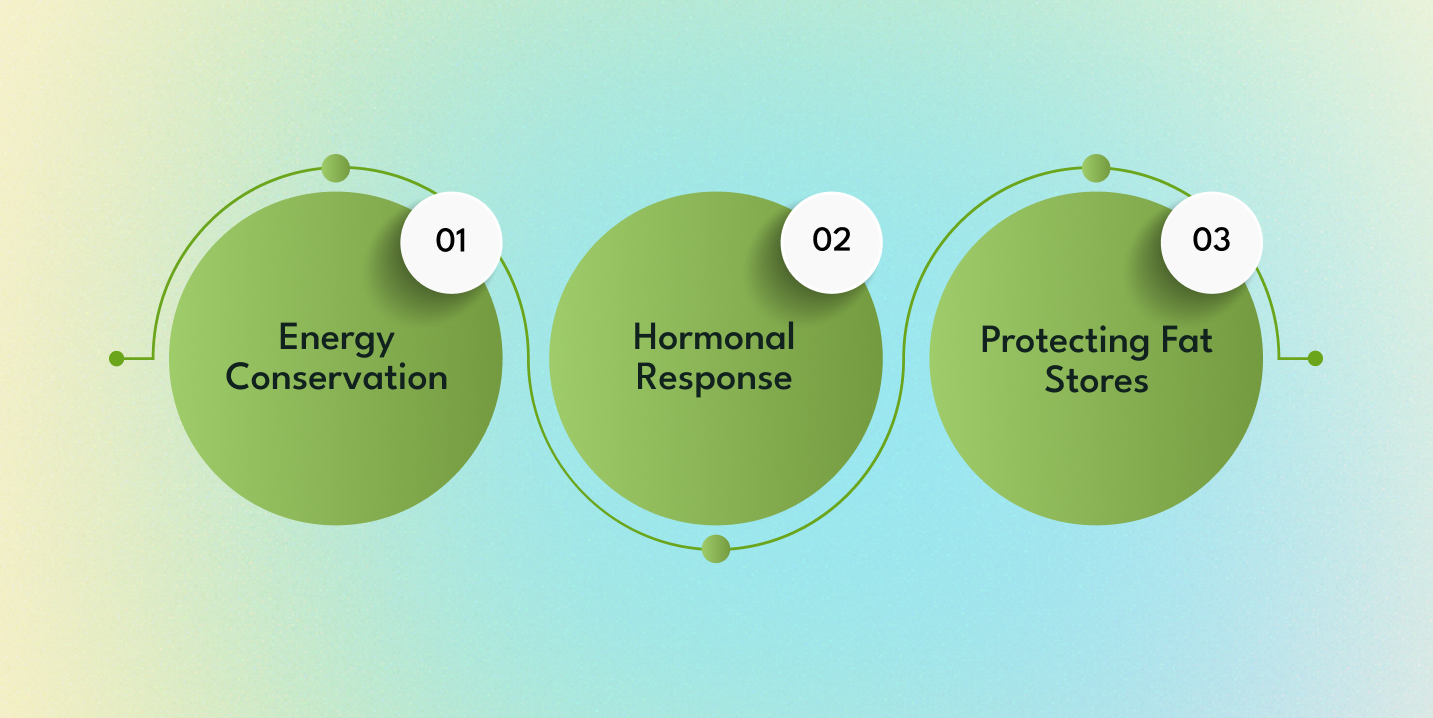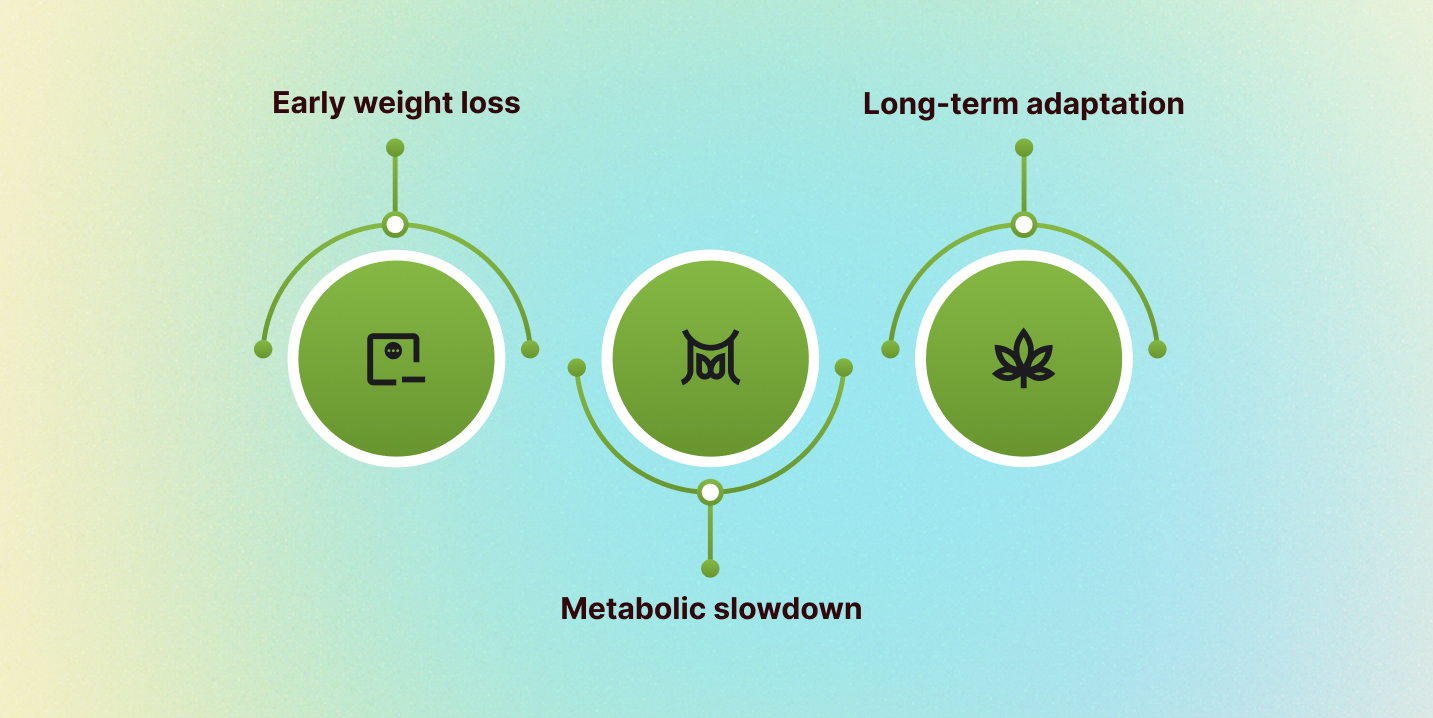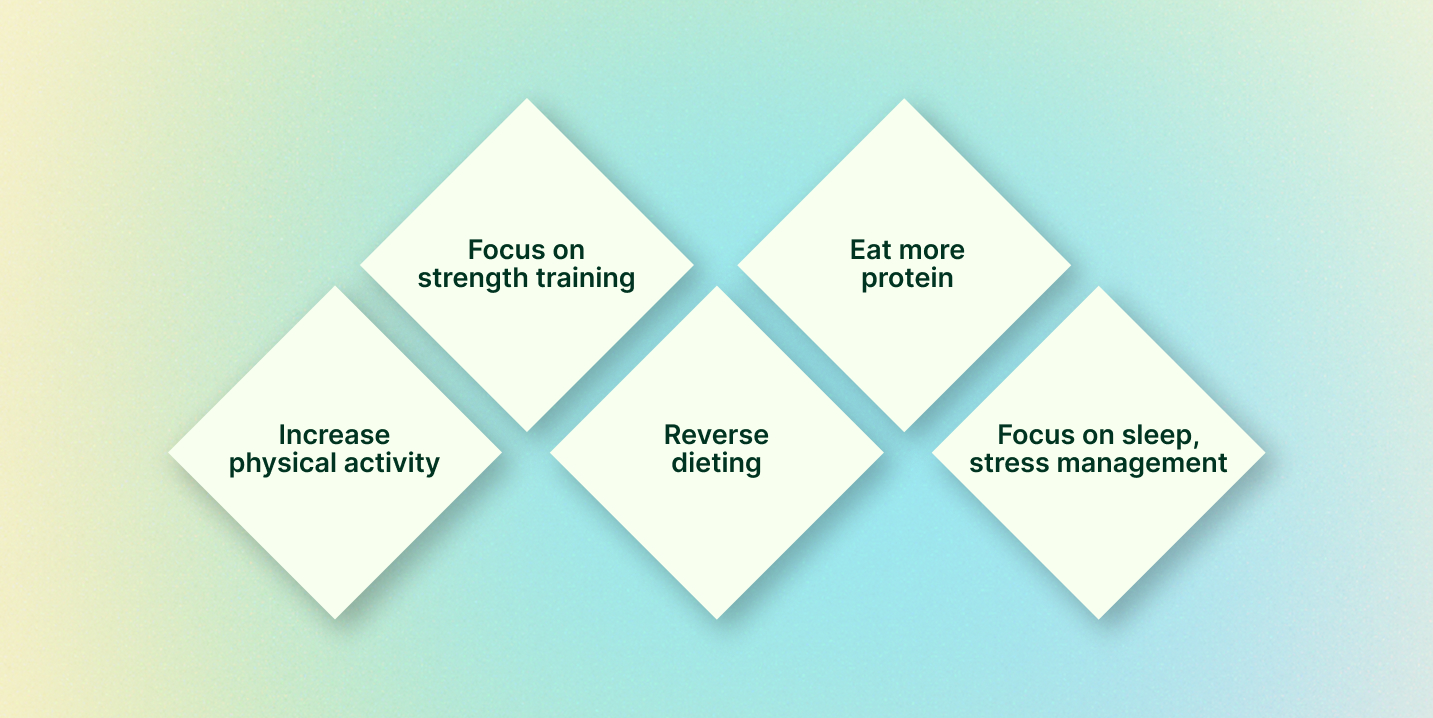Key Takeaways
-
Metabolic changes occur during weight loss, including a slower resting metabolic rate and hormonal shifts that increase hunger
-
Adaptive thermogenesis is your body’s way of conserving energy, slowing down calorie burn to protect against further weight loss
-
Muscle mass plays a key role in keeping metabolism high; losing muscle can make weight loss harder
-
Metabolic adaptation can take a few weeks to months, with weight loss slowing as your body adjusts to the new weight
-
Practical tips to overcome metabolic slowdown include increasing physical activity, strength training, reverse dieting, and prioritizing sleep
Have you ever noticed your weight loss slowing down even when you're sticking to your routine? It can be frustrating, but don’t worry, this is a completely normal part of the process. Your body is adjusting to changes, and your metabolism plays a crucial role in this process. As you lose weight, your metabolism also changes, and these shifts can impact how your body burns calories and stores energy.
Understanding these metabolic changes can help you stay on track and make the necessary adjustments to continue making progress.
Let's explore what happens to your metabolism during weight loss, why it adapts, and how you can maintain momentum on your journey.
What happens metabolically when you lose weight?
When you lose weight, your metabolism undergoes several changes to accommodate the new body weight. Here's what happens:
-
Resting metabolic rate (RMR)
As you lose weight, your body requires fewer calories to function. This is because your lean body mass, which burns the most energy, decreases as you lose fat. This results in a drop in your resting metabolic rate (RMR), which is the number of calories your body burns at rest. This slowdown in RMR means your body isn't burning as many calories as it did when you were heavier.
-
Hormonal changes
Weight loss affects several hormones, most notably leptin and ghrelin. Leptin, the hormone that helps signal fullness, decreases with weight loss, which can make you feel hungrier. At the same time, ghrelin, the hormone that stimulates hunger, increases, which in turn encourages food cravings. This imbalance can make it harder to stick to your weight loss plan, but it's a natural survival mechanism.
-
Calorie expenditure
When you lose weight, your body becomes more efficient at using energy, meaning it burns fewer calories during exercise and daily activities. This adaptation, called adaptive thermogenesis, is your body’s way of protecting itself from starvation, which can make continued weight loss more challenging.
Metabolic changes during weight loss are a natural process as your body adjusts to a new weight. With a reduced metabolic rate and changes in hunger hormones, your body may fight against weight loss. Understanding these changes is key to staying patient and adjusting your strategy as needed.
If you're looking for a way to support your metabolism as you move forward with weight loss, consider trying Metabolically Lean | Supports Weight Management. It can help supercharge your metabolism and keep things on track.
Adaptive thermogenesis: The body’s defense mechanism

Your body is constantly striving to maintain balance, and when you lose weight, it perceives this as a threat. This is where adaptive thermogenesis comes in.
-
Energy conservation
When you start losing weight, your body naturally tries to conserve energy by reducing the number of calories burned. This means that even if you're still eating fewer calories, your body adjusts to use less energy to perform the same tasks. This slowdown in calorie expenditure results in slower weight loss over time.
-
Hormonal response
The body’s hormonal responses also play a significant role in slowing down weight loss. As you lose weight, leptin levels drop, signaling your brain that you’re not eating enough. As a result, your brain encourages you to eat more, which leads to increased hunger and cravings. At the same time, ghrelin levels rise, further contributing to feelings of hunger.
-
Protecting fat stores
Your body is hardwired to protect fat stores. As your fat cells shrink during weight loss, your body triggers mechanisms to restore them to their previous size. This biological response is designed to prevent starvation, but it can make it more challenging to lose weight over time.
Adaptive thermogenesis is your body’s survival mechanism that slows your metabolism and increases hunger signals to prevent extreme weight loss. While it can be frustrating, understanding this process helps you make adjustments to keep moving forward.
Muscle mass’s role in weight loss adaptation
Muscle mass is an often-overlooked factor in weight loss. Here’s how muscle plays a key role in maintaining a healthy metabolism:
-
Muscle burns more calories
Muscle tissue needs more energy to maintain than fat, which means the more muscle you have, the more calories your body burns at rest. This is crucial for maintaining a high metabolism during weight loss. Losing muscle can cause your metabolism to slow down, making weight loss even harder.
-
Strength training
Incorporating strength training into your routine helps preserve and even build muscle mass, preventing the metabolic slowdown that often accompanies weight loss. Exercises like weightlifting, resistance band training, or bodyweight exercises are key to maintaining a high metabolism while burning fat.
-
Protein intake
Ensuring you get enough protein is important when you're losing weight, as it helps preserve muscle mass. Protein not only supports the repair and growth of muscle tissue but also increases calorie burn during digestion, known as the thermic effect of food. This makes it more efficient than fats or carbs in boosting metabolism. Make sure your diet includes sufficient protein to maintain strong muscles and keep your metabolism working at its best.
Maintaining muscle mass is necessary for keeping your metabolism active during weight loss. By incorporating strength training and eating enough protein, you can maintain muscle during weight loss, which helps keep your metabolism high and supports continued fat loss.
How long does it take for the body to adapt?

The process of metabolic adaptation can vary for each person, but here's a general timeline of what to expect:
-
Early weight loss
In the first few weeks or months of weight loss, you may notice a rapid decrease in weight, as your body burns fat faster. However, as you lose weight, the process naturally slows down because your metabolism adjusts to the new weight.
-
Metabolic slowdown
After several weeks of consistent weight loss, your metabolism begins to adjust to the new weight. This means that your body needs fewer calories, and weight loss may slow. At this point, your body is trying to conserve energy, leading to a plateau where progress feels stagnant.
-
Long-term adaptation
Over time, your body will fully adapt to the new weight, and you will reach a new equilibrium. It can take several months for your metabolism to fully adjust to your new body, but once it does, weight loss can resume with proper adjustments to diet and exercise.
Metabolic adaptation happens over time, and weight loss may slow down as your body adjusts. Be patient, and know that after a period of adaptation, your body will reach a new equilibrium, and you can continue your progress.
Hitting a weight loss plateau is a common experience during your journey. To understand why it happens, watch this insightful video by The Good Bug: Are You Struggling To LOSE More WEIGHT? Understand WEIGHT LOSS PLATEAU.
Practical tips to overcome metabolic adaptation

Metabolic adaptation doesn’t mean your weight loss journey is over. Here are some practical tips to overcome it:
-
Increase physical activity
Add more cardio to your routine, such as walking, cycling, or swimming, to burn extra calories. HIIT (high-intensity interval training) can also boost your metabolism by increasing calorie burn even after your workout.
-
Focus on strength training
Regularly engage in strength training to preserve muscle mass and avoid metabolic slowdown. Try at least two to three strength training sessions a week to maintain muscle and keep your metabolism running efficiently.
-
Reverse dieting
If your metabolism has slowed too much, reverse dieting can help. Gradually increase your calorie intake over time to prevent further metabolic slowdown and support sustainable weight loss.
-
Eat more protein
Increasing your protein intake helps preserve muscle, support metabolism, and keep you feeling full longer. Include lean sources like chicken, turkey, tofu, or beans in your meals.
-
Prioritize sleep and manage stress
Poor sleep and high stress can trigger hormonal imbalances that make weight loss harder. Aim for at least 7-9 hours of quality sleep each night and practice stress-reducing activities, such as yoga, meditation, or deep breathing.
Overcoming metabolic adaptation requires a multifaceted approach that includes increasing physical activity, adjusting your calorie intake, and focusing on muscle preservation. With these practical tips, you can continue to make progress toward your weight loss goals.
Metabolic changes during weight loss are natural and part of your body’s defense mechanism. As your body adapts, it’s essential to understand these changes so you can take the necessary steps to maintain your progress. By focusing on strength training, increasing protein intake, managing stress, and adjusting your workout routine, you can overcome metabolic adaptation and continue losing weight effectively.
Ready to support your metabolism and keep your weight loss journey on track? Try the Weight Management Super Bundle, a powerful combo of probiotics and prebiotic fiber to support your metabolism and improve digestion. Stay consistent, stay patient, and make small adjustments to keep making progress.
Frequently Asked Questions (FAQs)
-
What happens to metabolism when you lose weight?
Your metabolism naturally slows down as your body requires fewer calories, which is a result of hormonal changes and a decrease in lean muscle mass.
-
How do I keep my metabolism from slowing down?
To keep your metabolism active, focus on preserving muscle by strength training, consuming adequate protein, and maintaining a healthy level of physical activity.
-
Is it normal for weight loss to plateau?
Yes, it’s normal. As you lose weight, your metabolism adapts, and weight loss slows down. Adjusting your diet and workout routine can help you break through the plateau.
-
Can strength training help boost my metabolism?
Absolutely! Strength training helps preserve muscle mass, which burns more calories at rest, keeping your metabolism higher during weight loss.
-
How long does it take for the body to adapt to weight loss?
It can take anywhere from a few weeks to a few months for your body to fully adjust to weight loss. As your metabolism adapts, weight loss may slow, but it can resume with the right adjustments.
If you're looking for ways to give your metabolism a little extra help, you may want to check out our blog on Best Supplements to Boost Metabolism for Weight Loss to enhance your weight loss efforts.


